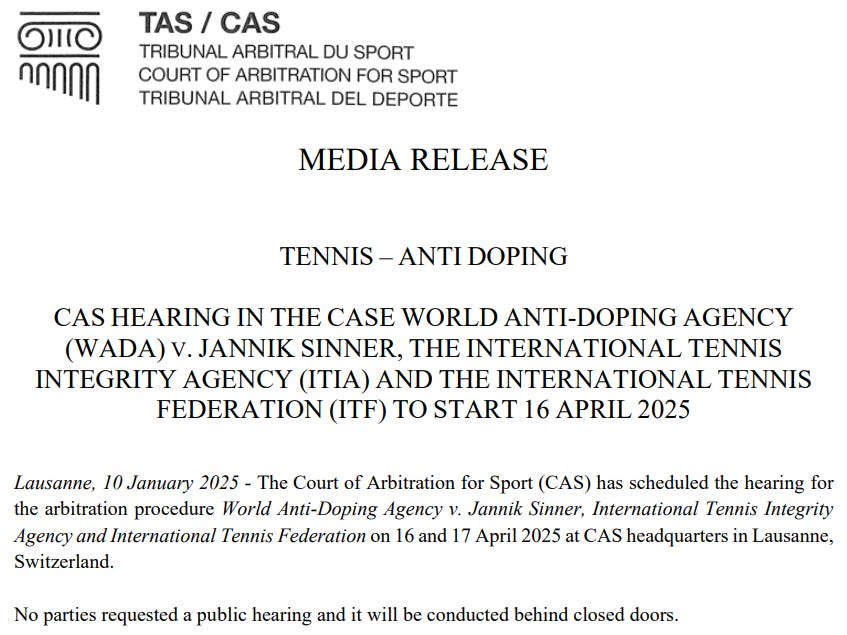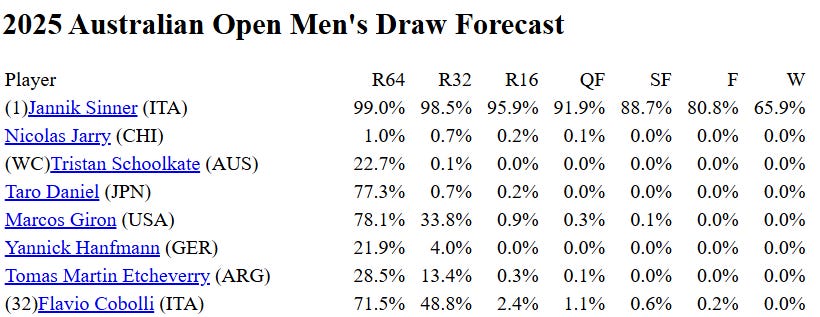A Judgment Day for Sinner
The date has finally been set for WADA's appeal of the favorable initial verdict Jannik Sinner received after his positive test.

MELBOURNE, Australia — The answer to one of the most important lingering questions for this season of men’s tennis came, as it happened, a few hours after I asked it.
At Australian Open media day on Friday, I asked Jannik Sinner if he had any more information about the timing of his hearing at the Court of Arbitration for Sport (CAS), prompted by an appeal the World Anti-Doping Agency (WADA).
As a refresher: WADA’s appeal was filed to CAS in late September, challenging the optimally favorable “no fault or negligence” verdict that the independent tribunal commissioned by the International Tennis Integrity Agency (ITIA) awarded to Sinner after his positive test for the banned substance clostebol. WADA has said it is not necessarily challenging the facts of the case but rather the degree of fault attributable to Sinner, and is “seeking a period of ineligibility of between one and two years.”
Three-and-a-half months onward from news of that appeal being lodged, here in mid-January there had still been no news yet of a date being set for the hearing. It was clear from looking at what had been published of CAS’s upcoming calendar that Sinner wouldn’t get a hearing before mid-February; beyond that, nothing was known.
Here’s my question and Sinner’s answer:
Bounces: Do you have clarity on when your CAS hearing is going to be? How much has that pending date been affecting your mood or stress levels at all?
JANNIK SINNER: Yeah, I know exactly as much as you guys know. We are in a stage where we don't know many, many things.
Yeah, you think about this, of course. I would lie if I would tell you I forget. No, it's not like this. It's something what I have with me now already for quite a long time.
But it is what it is. I'm here trying to prepare the Grand Slam. Let's see how it goes.
After three-and-a-half months without word of when his hearing will be held, CAS (with timing perhaps prompted by the question?) finally announced a date for Sinner’s case about 15 hours later:
The Court of Arbitration for Sport (CAS) has scheduled the hearing for the arbitration procedure World Anti-Doping Agency v. Jannik Sinner, International Tennis Integrity Agency and International Tennis Federation on 16 and 17 April 2025 at CAS headquarters in Lausanne, Switzerland.
No parties requested a public hearing and it will be conducted behind closed doors.
While the news of a hearing date may ease some of the anxiety caused by uncertainty for Sinner, a mid-April date for his hearing is bad news for the viability of his 2025 season.
While WADA has said it is seeking a 1-2 year ban, consensus has been that a shorter penalty of 1-3 months is most likely in this case if CAS overturns the original verdict. If the hearing had been in February, a ban in that range that could have been served to completion without Sinner being forced to miss a Grand Slam event. But with a mid-April hearing, a ban of that length could easily straddle both the French Open and Wimbledon, and perhaps even the U.S. Open if a fourth month (or beyond) is also handed down.
It’s impossible to know exactly how long it will take CAS to reach a verdict after the April hearing, but we do have recent precedent as a guide: in Simona Halep’s CAS appeal last year, her hearing concluded on February 10th and her favorable verdict was announced on March 6th (with the full decision not being published until seven months later).
That’s a 24-day wait for the verdict; if Sinner’s is similar, his verdict would come out around May 11th, give or take. Even a one-month ban from then would keep him out of the French Open, which starts on May 25th this year; a two month ban would also knock him out of Wimbledon, which starts on June 30th this year. If a ban is more than three months (or takes longer to be determined), the U.S. Open which starts on August 25th this year could also be in jeopardy.
That timing has to be frustrating for Sinner, and for men’s tennis as a whole, but it’s even more frustrating that this appeal process hasn’t already been resolved. CAS has established itself as the arbitration body for all Olympic sport federations, including tennis, and that scope has caused a considerable backlog of cases.
As much as perceptions of favorable treatment for stars has been bemoaned in both Sinner and Iga Swiatek’s positive test sagas, I think CAS should have done everything possible to expedite Sinner’s proceedings so that they could have been resolved before this imminent major tournament. As a dominant No. 1 in men’s tennis—and the defending champion here in Melbourne— Sinner is disproportionately relevant to the competition of the Australian Open, and therefore disproportionately relevant to the integrity of its results.
According to Tennis Abstract’s analytics-based forecasting for the 2025 Australian Open, Sinner has an overwhelming 65.9 percent chance of winning the 2025 Australian Open title, and an equally staggering 80.8 percent chance of making the final.
Other men’s players who have recently gone through an anti-doping adjudication process, like Jenson Brooksby or Mikael Ymer, bluntly were nowhere near as relevant to the ultimate results of major tournaments. I think it’s been a disservice to the entire sport for CAS not to move Sinner’s case to the front of the line; there should have been plenty of time after WADA’s appeal back in September to get this hearing—which wouldn’t seem to require any new evidence compared to the first hearing in front of the ITIA’s tribunal back in August—over and done with by now.
If Sinner wins a major title during this lag time before an eventual finding of greater culpability for his positive test, I think it makes this Australian Open an avoidably asteriskable event. That would be a shame for all involved, Sinner included.
There likely won’t be any further developments in Sinner’s case until the hearing rolls around in April. Until then, there’s an ominous shadow of a lingering hammer that will flicker over Sinner and the rest of the men’s tennis ladder below him.
Speaking of WADA, it’s not directly a tennis story but I encourage folks to read the reports into the growing schism between WADA and the U.S. government, spurred by American fury that WADA did not discipline nearly two dozen Chinese swimmers who had tested positive for Trimetazidine (the same substance at the heart of the Iga Swiatek case).
The U.S. government withheld funding from WADA in response, and WADA has since retaliated by removing the American representative from its board. I got to collaborate on reporting with both Mike Schmidt and Tariq Panja, the two reporters who have covered this story for nearly a year now, during my time working for The New York Times; they’re both stellar journalists who have done great work since first breaking this story last April, and I’m fascinated where this saga goes from here.
Thank you for reading Bounces! To support my work here at the 2025 Australian Open and beyond, please consider becoming a subscriber. -Ben








I agree one hundred percent that the process is mired in a ridiculous proceduralism with no regard for pragmatics of the sport (as if nfl touchdown reviews took two weeks!). I also think it's absurd that they want a more severe penalty when they are not contesting the accepted facts of the case. The accepted facts do not warrant a suspension. If they were contesting the facts, that would be another matter; as we've discussed here, there are elements of the case that could be questioned, but that's not what's happening. I'm pretty hard core on drug testing and was fine with Halep and Sharapova, but this is making me wonder if the ATP should look for a different drug testing system.
Late to this, but I’m not convinced the AO would be asteriskable if Sinner wins. The asterisk should be if he has benefited from a performance-enhancing drug. That he isn’t currently enhanced doesn’t seem to be in dispute.